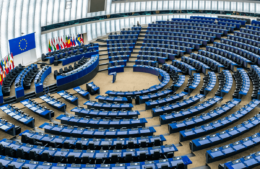Genocide debate puts Germany in tough spot with Turkey
- (0)
Genocide debate puts Germany in tough spot with Turkey –

Last April 24, on the 100th anniversary of what Armenians call the Great Crime, the Bundestag postponed voting on a similar resolution to classify the mass killings as genocide. Yet the accompanying debate clearly showed that parliamentarians from all factions in parliament viewed the massacre as such.
(Deutsche Welle) – As Armenia commemorates 101 years since the Great Crime, Germany is still not sure whether “genocide” is officially the right word. A scheduled early-June debate in the Bundestag could complicate relations with Turkey.
April 24 commemorates the 101st anniversary of the events that many historians and a couple of dozen nations commonly refer to as the Armenian Genocide. And, if a plan agreed to by the ruling Christian Democrats (CDU) and their Bavarian sister party, the Christian Social Union, comes to fruition, Germany could also do so soon. Or at the very least discuss doing so – once again.
The decision by the governing coalition, which includes the Social Democrats, was forced when the opposition Greens introduced a resolution in February to recognize the massacre, deportation and starvation of up to 1.5 million Armenians during the dying days of the Ottoman Empire as “genocide.”
The Greens ultimately pulled the measure after the governing coalition agreed to work on a joint resolution. That was good timing for Chancellor Angela Merkel and her EU counterparts ahead of March’s critical summit to seal a controversial deal on refugees and deportations with Turkey.
The Bundestag will likely take up the debate on June 2 – just before the summer parliamentary recess – according to an agreement reached in April between the Greens and the government.
The Great Crime
As the successor state to the Ottoman Empire, Turkey officially denies that the events that started in 1915 amounted to genocide and has lashed out at countries that have officially recognized the term.When France formally called the displacements and killings genocide in 2011, Turkey temporarily recalled its ambassador; it did the same thing to Austria last year. Were Germany to formally adopt the term, Turkey could pull its ambassador from Berlin and throw the EU migration deal into doubt.
Last April 24, on the 100th anniversary of what Armenians call the Great Crime, the Bundestag postponed voting on a similar resolution to classify the mass killings as genocide. Yet the accompanying debate clearly showed that parliamentarians from all factions in parliament viewed the massacre as such.
German President Joachim Gauck and CDU Bundestag President Norbert Lammert both used the term to describe the cleansing of ethnic Armenians from eastern Anatolia. The draft resolution also recognized Germany’s role in the killings as an Ottoman ally in World War I and called for a rapprochement between Turkey and Armenia.
Avoiding Turkey’s wrath
For strategic reasons, the governing coalition opted not to vote on the resolution last April, and again in October, in order to avoid a confrontation with Turkey at a time when large numbers of displaced people were transiting the country en route to Germany and the European Union.
The fact that Germany and the EU have now signed a pact with Turkey on refugees – a deal that officials in Ankara have repeatedly threatened to withdraw from – puts additional pressure on Merkel’s government.
Given Germany’s need for Turkey’s cooperation with refugees and deportations, it is unclear how or if a vote in June would proceed. Backing out could set up Merkel forfurther criticism that she is kowtowing to Turkey.
Turkey officially refers to what happened as the “Events of 1915” and denies that the massacres and deportations amounted to genocide. The official line is that ethnic Armenians represented a fifth column backed by Russia during World War I, and that the mass deportation and accompanying Armenian deaths were not premeditated or intentional – a key requirement in the legal definition of genocide.
Officials in Turkey put the number of Armenians who died at around 500,000, while Armenia puts the number at about 1.5 million out of a prewar population of some 2 million. Turkish officials also point out that hundreds of thousands of Muslims died from combat, starvation, cold and disease in eastern Anatolia during the war. Armenians have documented systematic mass murder, organized banditry, raping of women, pillaging of property and other atrocities.
Nearly 30 countries have formally recognized the massacres as genocide. Keen to avoid irking a key ally, the United States has avoided using the term, although more than 40 US state legislatures have passed genocide resolutions.


















